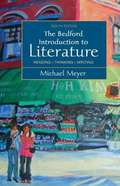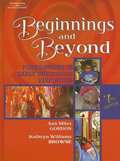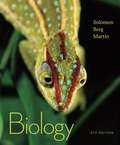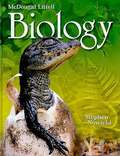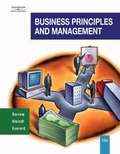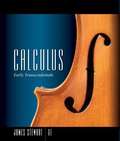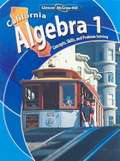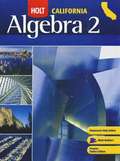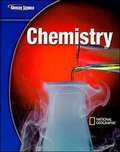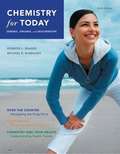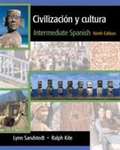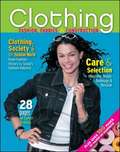- Table View
- List View
More NIMAC books are available at www.nimac.us. If you find your title in the NIMAC and not in Bookshare then please contact us to request it.
The Bedford Introduction To Literature: Reading, Thinking, Writing
by Michael MeyerThis new compact edition ofThe Bedford Introduction to Literatureoffers all the distinctive features of Michael Meyer's best-selling introduction to literature in a shorter, less expensive paperback format. A generous and vibrant selection of stories, poems, and plays are supported by editorial features proven to help students read, think, and write effectively about literature. Now featuring unique visual portfolios and a CD-ROM packed with activities and contextual material, the new edition brings literature to life for students like never before.
The Bedford Introduction To Literature: Reading, Thinking, Writing
by Michael MeyerThe Bedford Introduction to Literatureresponds to the teaching and learning needs of all kinds of literature classrooms -- and composition courses where literature is a focus. Author Michael Meyer understands that a particular challenge for instructors is that students do not necessarily see literature as relevant to their lives. They may be new to the study of literature, may have difficulty reading it, and may lack confidence in their critical abilities and writing skills. With these factors in mind, Meyer has put together a lively collection of stories, poems, and plays from many periods, cultures, and themes, with voices ranging from the traditional to the latest and hottest contemporary authors. As an experienced anthologist and instructor of literature, Meyer has a knack for choosing enticing selections -- including humorous works and readings from popular culture -- that students both enjoy and respond to. Complementing this unparalleled collection are proven editorial features that offer students real help with reading, appreciating, and writing about literature. The Bedford Introduction to Literatureis a book designed to bring literature to life -- and to make students life-long readers.
Beginnings and Beyond: Foundations in Early Childhood Education
by Ann Miles Gordon Kathryn Williams BrowneBeginnings & Beyond, 7e is an introductory text that has stood the test of time with the ability to respect all learners, while introducing them to the wide range of content areas needed to understand early childhood education. Students find that the book is useful to them over time, and well into their professional life. As teachers, former students return to the chapters on guidance, observation & assessment, and curriculum as they grow in their work with children. Thus, this is an excellent book for a foundations course, for a curriculum course, and as a reference for teachers both at the beginning level, and beyond as a seasoned teacher in their career
Biology
by Eldra P. Solomon Linda R. Berg Diana W. MartinStudying biology in today's fast-paced environment where new research is cropping up daily is exciting--and also a bit daunting, unless you have the right textbook to help you make sense of it all. Popular with students at colleges nationwide, Solomon, Berg, and Martin's BIOLOGY is often described as the best text available for learning biology. Filled with resources to guide your study, the Eighth Edition brings clarity to key concepts as it draws you into the excitement of new research in genetics, cell communication, evolution, and many other topics. The book's in-chapter Learning System is like a built-in study guide, focusing your attention on key learning objectives. Many of the text's colorful illustrations are correlated with animated figures online so you can interactively study and reinforce your understanding of complex processes.
Biology
by Stephen Nowicki"The 21st century will be the century of biological science, just as the 20th century was the century of physical science," predicts Professor Stephen Nowicki, an award-winning teacher at Duke University. Dr. Nowicki has adapted his acclaimed introductory biology course for The Teaching Company to bring you up to date on one of the most important fields of knowledge of our time and help you appreciate the marvelous diversity and complexity of life. You will obtain the background and guidance to explore in depth the fundamental principles of how living things work-principles such as evolution by natural selection, the cellular structure of organisms, the DNA theory of inheritance, and much more. This challenging course is organized around three major themes: "Information and Evolution," "Development and Homeostasis," and "Energy and Resources." You will explore living systems at all levels, from biological molecules to global ecosystems. You will gain insight into pressing issues facing society, including genetic modification and cloning, stem-cell research, AIDS, the depletion of the rainforests, and global warming. You will discover mechanisms behind such intriguing phenomena as why children resemble their parents, why plants bend toward light, how memories are stored, why some birds have very long tails, and how life itself began on Earth. Above all, you will learn how to think about biology, so that in your day-to-day life you will understand the significance and complexities of news stories, medical issues, and public debates, not to mention what is going on in your own garden and in nature all around you.
Biology (California)
by Stephen Nowicki"The 21st century will be the century of biological science, just as the 20th century was the century of physical science," predicts Professor Stephen Nowicki, an award-winning teacher at Duke University. Dr. Nowicki has adapted his acclaimed introductory biology course for The Teaching Company to bring you up to date on one of the most important fields of knowledge of our time and help you appreciate the marvelous diversity and complexity of life. You will obtain the background and guidance to explore in depth the fundamental principles of how living things work-principles such as evolution by natural selection, the cellular structure of organisms, the DNA theory of inheritance, and much more. This challenging course is organized around three major themes: "Information and Evolution," "Development and Homeostasis," and "Energy and Resources." You will explore living systems at all levels, from biological molecules to global ecosystems. You will gain insight into pressing issues facing society, including genetic modification and cloning, stem-cell research, AIDS, the depletion of the rainforests, and global warming. You will discover mechanisms behind such intriguing phenomena as why children resemble their parents, why plants bend toward light, how memories are stored, why some birds have very long tails, and how life itself began on Earth. Above all, you will learn how to think about biology, so that in your day-to-day life you will understand the significance and complexities of news stories, medical issues, and public debates, not to mention what is going on in your own garden and in nature all around you.
Biology (Georgia)
by Stephen Nowicki"The 21st century will be the century of biological science, just as the 20th century was the century of physical science," predicts Professor Stephen Nowicki, an award-winning teacher at Duke University. Dr. Nowicki has adapted his acclaimed introductory biology course for The Teaching Company to bring you up to date on one of the most important fields of knowledge of our time and help you appreciate the marvelous diversity and complexity of life. You will obtain the background and guidance to explore in depth the fundamental principles of how living things work-principles such as evolution by natural selection, the cellular structure of organisms, the DNA theory of inheritance, and much more. This challenging course is organized around three major themes: "Information and Evolution," "Development and Homeostasis," and "Energy and Resources." You will explore living systems at all levels, from biological molecules to global ecosystems. You will gain insight into pressing issues facing society, including genetic modification and cloning, stem-cell research, AIDS, the depletion of the rainforests, and global warming. You will discover mechanisms behind such intriguing phenomena as why children resemble their parents, why plants bend toward light, how memories are stored, why some birds have very long tails, and how life itself began on Earth. Above all, you will learn how to think about biology, so that in your day-to-day life you will understand the significance and complexities of news stories, medical issues, and public debates, not to mention what is going on in your own garden and in nature all around you.
Biology (Kentucky)
by Stephen Nowicki"The 21st century will be the century of biological science, just as the 20th century was the century of physical science," predicts Professor Stephen Nowicki, an award-winning teacher at Duke University. Dr. Nowicki has adapted his acclaimed introductory biology course for The Teaching Company to bring you up to date on one of the most important fields of knowledge of our time and help you appreciate the marvelous diversity and complexity of life. You will obtain the background and guidance to explore in depth the fundamental principles of how living things work-principles such as evolution by natural selection, the cellular structure of organisms, the DNA theory of inheritance, and much more. This challenging course is organized around three major themes: "Information and Evolution," "Development and Homeostasis," and "Energy and Resources." You will explore living systems at all levels, from biological molecules to global ecosystems. You will gain insight into pressing issues facing society, including genetic modification and cloning, stem-cell research, AIDS, the depletion of the rainforests, and global warming. You will discover mechanisms behind such intriguing phenomena as why children resemble their parents, why plants bend toward light, how memories are stored, why some birds have very long tails, and how life itself began on Earth. Above all, you will learn how to think about biology, so that in your day-to-day life you will understand the significance and complexities of news stories, medical issues, and public debates, not to mention what is going on in your own garden and in nature all around you.
Business Principles and Management
by James L. Burrow Brad Kleindl Kenneth E. EverardBUSINESS PRINCIPLES AND MANAGEMENT 12E provides an introduction to business management concepts and principles in a realistic, investigative, and enriching manner. Business Operations are approached from the entrepreneurial and management perspective. All the functions of business management are covered extensively, including the use of technology and communication as tools of business. Explore the global dimension of business and possible career opportunities.
Calculus: Early Transcendentals
by James StewartSuccess in your calculus course starts here! James Stewart's CALCULUS texts are world-wide best-sellers for a reason: they are clear, accurate, and filled with relevant, real-world examples. With CALCULUS: EARLY TRANCENDENTALS, Sixth Edition, Stewart conveys not only the utility of calculus to help you develop technical competence, but also gives you an appreciation for the intrinsic beauty of the subject. His patient examples and built-in learning aids will help you build your mathematical confidence and achieve your goals in the course!
California Algebra 1: Concepts, Skills, and Problem Solving
by Beatrice Luchin Gilbert J. Cuevas Berchie HollidayNIMAC-sourced textbook
The Challenge of Democracy: Government in America
by Kenneth Janda Jeffrey M. Berry Jerry GoldmanThe Challenge of Democracy is well-known for its exploration of two themes: the conflicting values of freedom, order, and equality and the majoritarianism vs. pluralism debate. In addition, a focus on globalization and its implications helps students put American government in a broader context. Current coverage includes the latest developments in American Government, including the results of key races in the 2006 mid-term election. Student Achievement Series: The Challenge of Democracy is an innovative text and part of a program developed in partnership with teachers and students to meet the learning, study, and assessment goals necessary for student success. Through extensive research and focus groups conducted with a diverse cross-section of students, Houghton Mifflin presents a groundbreaking solution for skills mastery, understanding, and retention. Feedback from students has been instrumental in all aspects of development--from design and pedagogy to testing and assessment to title and packaging. These elements culminate in a textbook program that reflects the way students learn and study best. As with all texts in the Student Achievement Series, The Challenge of Democracy incorporates concise, to-the-point coverage; eliminates extraneous material; integrates pedagogy that reinforces key concepts; features a strong, supporting web component for review, testing, and assessment purposes; and provides students with real value for their educational dollar.
Chemistry
by Glencoe Mcgraw-HillDiscover the Flexibility to Teach Science Your Way!. "Glencoe Science: Chemistry," a module in the Glencoe Science 15 book series, provides students with accurate and comprehensive coverage of middle school National Science Education Standards. Concepts are explained in a clear, concise manner, and are integrated with a wide range of hands-on experiences, critical thinking opportunities, real-world applications, and connections to other sciences and to non-science areas of the curriculum. Co-authored by National Geographic, unparalleled graphics reinforce key concepts. A broad array of print and technology resources help differentiate and accommodate all learners. The modular approach allows you to mix and match books to meet your specific curriculum needs.
Chemistry for Today: General, Organic, and Biochemistry
by Spencer L. Seager Michael R. SlabaughYou will quickly gain a comprehensive understanding of chemistry with this new Sixth Edition of CHEMISTRY FOR TODAY: GENERAL, ORGANIC, AND BIOCHEMISTRY. Using real-life applications and interactive technology tools, this text will show you how chemistry relates to health science. The thorough integration of online assessment and learning tools turns study time into experiences with chemistry--helping you gain true comprehension of chemical concepts. CHEMISTRY FOR TODAY will help dispel any fear you may have of chemistry as it helps you appreciate the role chemistry plays in our daily lives through a rich pedagogical structure and an accessible writing style with lucid explanations. In addition, Seager and Slabaugh's CHEMISTRY FOR TODAY provides greater support in both the problem-solving and critical-thinking skills needed to succeed in chemistry. By illustrating how this information will help your future career and providing important career information online, the authors help you set goals and focus on achieving them.
Chemistry: Matter and Change, Solving Problems, Chemistry Handbook
by McGraw-HillNIMAC-sourced textbook
Civics in Practice Principles of Government and Economics (North Carolina)
by Gregory I. MassingNIMAC-sourced textbook
Civics Today: Citizenship, Economics & You
by Richard C. Remy John J. Patrick David C. Saffell Gary E. Clayton Dinah ZikeA civics program building the next generation of active Americans "Civics Today: Citizenship, Economics, and You" meets the content standards for civics and government as outlined by the National Standards for Civics and Government. Many young citizens are completing their education with little or no sense of civic responsibility. This program teaches the knowledge and skills needed to be an effective, active citizen. It also encourages an appreciation for the American political system and fosters a willingness to take part in American democracy. Two economics units provide an understanding of the interrelationship between democracy and the free enterprise system.
Civilización y cultura: Intermediate Spanish
by Lynn Sandstedt Ralph KiteThe readings in each unit of CIVILIZACION Y CULTURA match the thematic content of the units of the main book, CONVERSACION Y REPASO. There is better correlation of these supplementary books in marginal annotations on each unit-opening and unit-closing page.
Clothing: Fashion, Fabrics & Construction
by Jeanette Weber"Clothing: Fashion, Fabrics and Construction (c) 2008" is a comprehensive program that prepares students to make more informed decisions when buying and caring for clothes or examining career options.
